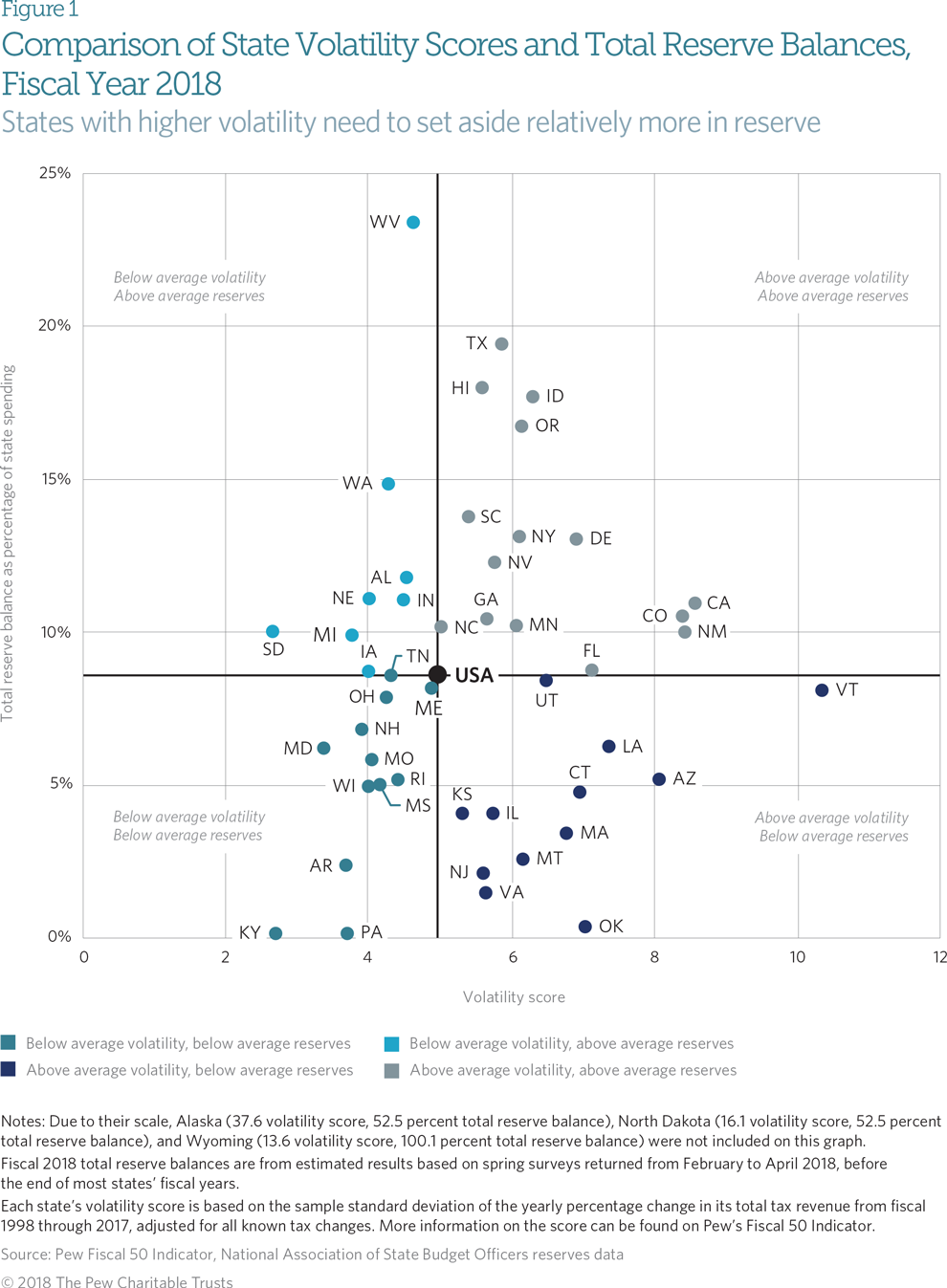State Revenue Volatility and Optimal Reserve Size Are Directly Linked

Pennsylvania is the fifth least volatile state by Pew’s measure, but its reserve level of 0.1 percent would provide little budget flexibility during a downturn. Shutterstock

Connecting state and local government leaders
Comparison of states provides insight into their ability to weather an economic downturn
The amount of money a state takes in fluctuates from year to year, with a range of factors influencing this volatility. Those factors can include specific tax revenue sources, the state’s economic profile, federal budget changes, and unforeseen events such as natural disasters. Although each state’s revenue swings may be unique, all face the challenges associated with managing these ups and downs.
Policymakers can use reserves to help offset revenue declines during down periods, such as recessions. But how much a state should hold in its reserves—its savings target—can vary as well, and for many reasons. For example, leaders in one state might have a higher risk tolerance than their peers, meaning they are more willing to save less than enough for the next downturn. Some may more routinely use other budget tools, such as raising revenue or cutting spending, to close a budget gap. These alternative approaches can reduce reliance on reserves.
However, revenue volatility remains a primary factor influencing optimal reserve size. In general, states with greater revenue volatility need to save relatively more than do those with less fluctuation. High revenue volatility means that tax collections tend to drop more dramatically during economic downturns.
Consider Alaska, the most volatile state, according to a Pew Charitable Trusts analysis. In fiscal year 2015, state tax collections declined 75 percent because of the drop in oil prices. The state had to rely on its reserves to help close a multibillion-dollar budget gap, drawing $3.8 billion from its rainy day funds that year, equivalent to 63 percent of the general fund budget.

Figure 1 looks at each state’s volatility ranking in the context of its total reserve balance, which is the combination of the rainy day fund balance plus the surplus money in the general fund at the end of the fiscal year. The relationship between these statistics can provide valuable insights and can serve as a warning sign that reserve levels may not be enough. States can fall into one of four quadrants on the figure, illustrating their position relative to U.S. averages. Those are:
Below-average reserves, below-average volatility (lower left quadrant)
States in this category have less revenue fluctuation compared with their peers but also have lower reserve balances. Although their revenue may not decline as severely during a recession, they still might not have enough set aside to mitigate even a mild recession. For example, Pennsylvania is the fifth least volatile state by Pew’s measure, but its reserve level of 0.1 percent would provide little budget flexibility during a downturn.
Above-average reserves, below-average volatility (upper left quadrant)
States in this category might be relatively better off than others. Their level of reserves are higher than average, and their revenue does not fluctuate as much as the typical state’s. Although their saving levels still may not be high enough to mitigate a severe recession, these states are in a stronger position than those with either lower reserves or higher volatility. Among the states in this group is South Dakota, the least volatile state and the one with the 21st-highest reserve level.
Below-average reserves, above-average volatility (lower right quadrant)
Meeting both these criteria and appearing in this quadrant should be a warning sign. These states experience larger revenue fluctuations than the typical state, so they are more likely to face significant declines in tax collections during a recession. At the same time, they hold lower reserves than their peers. For example, Arizona has the eighth most volatile tax revenue, but its reserves equal only 5.1 percent of expenditures, which ranks 37th.
Above-average reserves, above-average volatility (upper right quadrant)
States in this category have larger reserve levels than the average—funding levels that are probably warranted because they also experience greater revenue fluctuation. Although these states have saved more than many others, their higher level of revenue fluctuation mean they could need more. States in this category include California, which has the fifth most volatile revenue and the 16th highest reserve level.
Comparing these two indicators is just a starting point. To help states better understand the adequacy of their reserve levels, Pew recommends that policymakers periodically study their states’ economic and revenue volatility. Such analyses can help them develop policies for rainy day funds that smooth budgets throughout the business cycle and align with their objectives and characteristics.
Mary Murphy is a project director and Steve Bailey is an associate manager with The Pew Charitable Trusts' project on states' fiscal health.

NEXT STORY: Despite Major Wildfires, Most Calif. Local Governments Won’t Feel Credit Ratings Impacts


